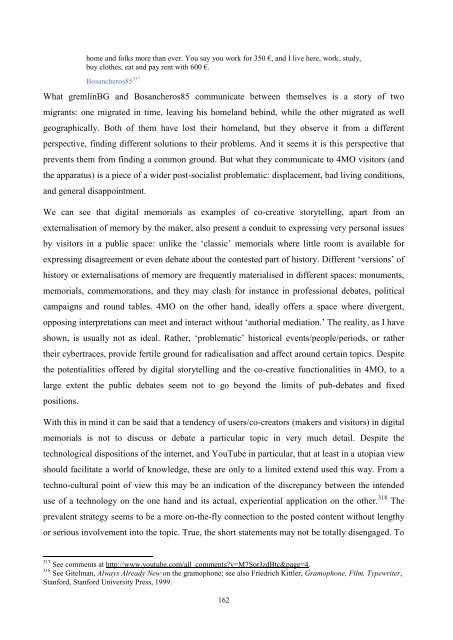UNIVERSITY OF NOVA GORICA GRADUATE SCHOOL ...
UNIVERSITY OF NOVA GORICA GRADUATE SCHOOL ...
UNIVERSITY OF NOVA GORICA GRADUATE SCHOOL ...
Create successful ePaper yourself
Turn your PDF publications into a flip-book with our unique Google optimized e-Paper software.
home and folks more than ever. You say you work for 350 €, and I live here, work, study,<br />
buy clothes, eat and pay rent with 600 €.<br />
Bosancheros85 317<br />
What gremlinBG and Bosancheros85 communicate between themselves is a story of two<br />
migrants: one migrated in time, leaving his homeland behind, while the other migrated as well<br />
geographically. Both of them have lost their homeland, but they observe it from a different<br />
perspective, finding different solutions to their problems. And it seems it is this perspective that<br />
prevents them from finding a common ground. But what they communicate to 4MO visitors (and<br />
the apparatus) is a piece of a wider post-socialist problematic: displacement, bad living conditions,<br />
and general disappointment.<br />
We can see that digital memorials as examples of co-creative storytelling, apart from an<br />
externalisation of memory by the maker, also present a conduit to expressing very personal issues<br />
by visitors in a public space: unlike the ‗classic‘ memorials where little room is available for<br />
expressing disagreement or even debate about the contested part of history. Different ‗versions‘ of<br />
history or externalisations of memory are frequently materialised in different spaces: monuments,<br />
memorials, commemorations, and they may clash for instance in professional debates, political<br />
campaigns and round tables. 4MO on the other hand, ideally offers a space where divergent,<br />
opposing interpretations can meet and interact without ‗authorial mediation.‘ The reality, as I have<br />
shown, is usually not as ideal. Rather, ‗problematic‘ historical events/people/periods, or rather<br />
their cybertraces, provide fertile ground for radicalisation and affect around certain topics. Despite<br />
the potentialities offered by digital storytelling and the co-creative functionalities in 4MO, to a<br />
large extent the public debates seem not to go beyond the limits of pub-debates and fixed<br />
positions.<br />
With this in mind it can be said that a tendency of users/co-creators (makers and visitors) in digital<br />
memorials is not to discuss or debate a particular topic in very much detail. Despite the<br />
technological dispositions of the internet, and YouTube in particular, that at least in a utopian view<br />
should facilitate a world of knowledge, these are only to a limited extend used this way. From a<br />
techno-cultural point of view this may be an indication of the discrepancy between the intended<br />
use of a technology on the one hand and its actual, experiential application on the other. 318 The<br />
prevalent strategy seems to be a more on-the-fly connection to the posted content without lengthy<br />
or serious involvement into the topic. True, the short statements may not be totally disengaged. To<br />
317 See comments at http://www.youtube.com/all_comments?v=M7SorJzdBtc&page=4.<br />
318 See Gitelman, Always Already New on the gramophone; see also Friedrich Kittler, Gramophone, Film, Typewriter,<br />
Stanford, Stanford University Press, 1999.<br />
162

















